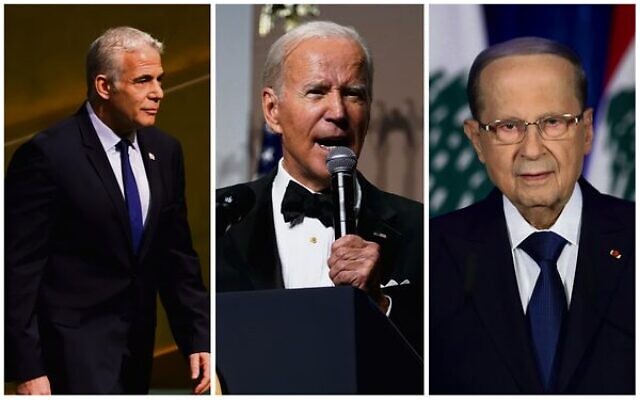Biden hails Israel border deal with Lebanon
The maritime deal "will provide for the development of energy fields for the benefit of both countries, setting the stage for a more stable and prosperous region, and harnessing vital new energy resources for the world".

US President Joe Biden on Tuesday separately phoned Israeli Prime Minister Yair Lapid and Lebanese President Michel Aoun on Tuesday to congratulate them on backing the first mutually agreed upon boundary between their two countries, in a US-brokered deal aimed at ending a decades-long maritime dispute.
“You’re making history,” Biden told Lapid, according to a readout from the Prime Minister’s Office, which also said that Lapid managed to secure a series of economic and security guarantees from the US in parallel to the agreement.
Biden said in a statement that the maritime deal announced by both governments earlier on Tuesday “will provide for the development of energy fields for the benefit of both countries, setting the stage for a more stable and prosperous region, and harnessing vital new energy resources for the world”.
He urged Jerusalem and Beirut to “uphold their commitments and work towards implementation”, as questions continued to rise about whether it would be possible to implement the deal, given that both countries are currently run by caretaker governments and that Israel is just weeks away from an election.
Still, Biden insisted that the agreement “protects Israel’s security and economic interests critical to promoting its regional integration”, while providing Lebanon “the space to begin its own exploitation of energy resources”.
A senior Israeli official familiar with the negotiations told reporters in a Tuesday statement that the agreement will see the buoy-marked borderline, established by Israel in 2000 and five kilometres off the coast of the northern town of Rosh Hanikra, recognised by the sides as an agreed-upon status quo. Lebanon will not be allowed to make counter-claims regarding that boundary unless a new maritime agreement is reached between the parties.
At the end of the buoys, Israel’s border will follow the southern edge of the disputed area known as Line 23, the senior Israeli official said.
Lebanon will enjoy the economic benefits of the area north of Line 23, including the Qana gas field, though the senior Israeli official said Jerusalem will receive monetary compensation for a certain percentage of revenue from the Qana, part of which lies south of Line 23. The exact compensation will be decided in negotiations with the French drilling company TotalEnergies.
Israel will also receive a letter of guarantees from the US stressing Washington’s commitment to Israel’s security and economic rights in case Hezbollah or another party fails to respect the deal, according to the senior Israeli official, who said the agreement will contribute to border stability and reduce Lebanon’s dependence on Iranian funds.
Meanwhile, a senior Biden official, who briefed reporters after the President spoke with Lapid and Aoun, warned Israel and Lebanon against waiting to ratify the US-brokered maritime agreement.
“No one can guarantee [what the future holds], and therefore no one can guarantee that opportunities for the security of Israel and the economic prosperity of Lebanon will still be there at a different time,” the senior US official said in response to a question regarding the timing of the deal just weeks before the November 1 Knesset election.
Opposition lawmakers along with Interior Minister Ayelet Shaked – who has expressed her desire to join a future government with many of the opposition parties – have insisted that the maritime deal should not go through while an interim government is in power and should be brought before the Knesset, which is not currently in session.
The senior Biden official expressed optimism that the deal will indeed be seen through.
“The governments on both sides are aware of the political reality that they live in, and I have every expectation that this agreement is going to be signed and put into force [as early as possible],” the official told reporters.
The senior US official went on to affirm Israel’s control over the Karish gas field, which is located south of Line 23, and dismissed threats made by Hezbollah that the terror group would attack Israel if the latter began extracting natural gas at the site before a maritime deal is reached.
Asked by the Times of Israel during the phone briefing whether the maritime deal announced on Tuesday factored in Hezbollah’s warnings, the senior US official said, “Threats are not what drove these negotiations. What drove them was the need to secure the entire coast for Israel and to provide economic interests for Lebanon.”
Times of Israel

comments